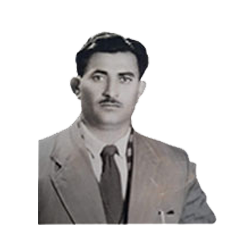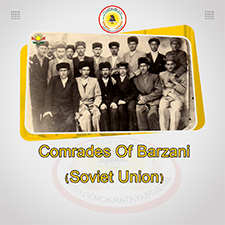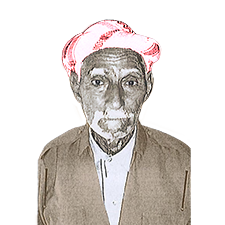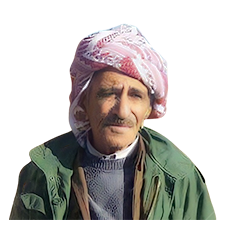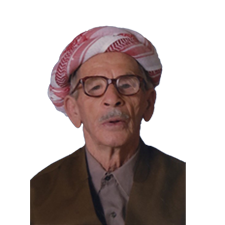Biography
Jibril Yahya Shalal was born in 1921 in Che village of Duhok province. He finished his education in the Soviet Union and graduated from the Institute of Agriculture. After that, He married Khadija Ismail Lova in the Soviet Union and they had two daughters, Rukhafza and Leila. He died in 1983 in Tehran, the capital of the Islamic Republic of Iran.
Service Record
After the second Barzan revolution's defeat on January 11th, 1945, Mustafa Barzani and his companions went to the east of Kurdistan. Jibril Yahya defended the republic of Kurdistan in Mahabad on March 31, 1946 as part of the Barzani army. After the Kurdistan Republic in Mahabad fell apart, Barzani returned from the east of Kurdistan to the south of Kurdistan. During that time, he participated in Naghada and Shno conflicts. In April19, 1947 he was one of the Peshmarga who returned to Sherwan and the Mizuri region through Khuakwrk and Barazgr area in the north of Kurdistan.
After their return on May 15, 1947, General Mustafa Barzani convenes a conference with his comrades in the village of Argush, and he gives them the option of remaining in Kurdistan or going to the Soviet Union. As a result, on April 23, 1947, he left for the Soviet Union alongside Mustafa Barzani. After that, he was engaged in the Gali Qtur and Prdi Mako fights. After a long and much difficulty, on June 18, 1947, on the Iranian-Soviet border, Mula Mustafa Barzani and his force crossed the Aras River.
Following their arrival in to Nakhchivan, Azerbaijan on June 19th, 1947, Mustafa Barzani and all of his companions were imprisoned for forty days. In fact, they were given the same treatment as prisoners of war in terms of food, clothing, and transportation while living in a camp which was surrounded by barbed wire and guarded by soldiers. Not long after, by decision of Soviet Union government, they were divided into groups and transferred to the regions of Aghdam, Lachin, Ayulakh and Kalbajar in the Republic of Azerbaijan. By December 10, 1947, they were moved to a military base on the Caspian Sea in Baku, the capital of the Republic of Azerbaijan. On the 23rd of the same month on the Caspian Sea in Baku, the capital of the Republic of Azerbaijan, Barzani's followers were organized into a military regiment and received training in military tactics and politics and taught to read and write Kurdish by their other educated Peshmarga.
As a result of Jafar Bakirov's mistreatment, On August 29, 1948, Mula Mustafa Barzani made the decision to relocate his military camp from Azerbaijan to the village of Chirchuk close to Tashkent, the capital of Uzbekistan, where they sustained their military training.
Following that, in March 1949, Mula Mustafa and his friends were split up into groups and sent by rail to the countryside of the Soviet Union, where they worked on the kolkhozes' crops. (Land that people rented from the government and then returned to it).
Finally after much effort and sending several letters by General Barzani to Stalin, Stalin finally received a letter in which Barzani talked about the suffering of his comrades. Stalin immediately decided to form a committee to investigate the situation of Barzani's comrades. When the committee investigated the situation of Barzani's comrades, they decided to gather them all in Vrievsky. As a result on November 1951, he went to Vrevsky, Soviet Union.
Once General Mustafa Barzani returns to Iraq after the revolution On July 14, 1958, he and his allies were got a general amnesty On February 25, 1959 in accordance with Articles 3 and 7, Paragraph (a) of Article 10, and Working with Article (11) based on the Amended Law No. 19.
In 1958, the Iraqi Republic was established under the leadership of Abdul Karim Qasim. on April 16, 1959 with his comrades on the ship Grozya through the port of Basra in the south of the Iraqi Republic. He affiliated in the Eylul Revolution in 1961 and after the collapse of the Eylul Revolution in 1975; he fled to Iran as a refugee. In 1976, he participated in the Gulan Revolution.
Sources:
- حكومهتی ههرێمی كوردستان، وهزارهتی پلان دانان، یهكه كارگێڕییهكانی پارێزگاكانی ههرێمی كوردستان و ژمارهی خێزانهكان و دانیشتوان، ههولێر، ٢٠٠٩ز).
- حهمید گهردی، پوختهی مێژوونامه، چاپی یهكهم، (ههولێر - دهزگای چاپ و بڵاوكردنهوهی ئاراس - چاپخانهی وهزارهتی پهروهرده - ٢٠٠٤ز).
- شهعبان عهلی شهعبان، ههندێك زانیاری سیاسی و مێژوویی، چاپی سێیهم، (ههولێر - چاپخانهی رۆژههلات - ٢٠١٣ز).
- شهوكهت شێخ یهزدین، یۆبیلی زێڕینی پێشمهرگه، (پیرمام - چاپخانه خهبات - ١٩٩٦ز).
- عمر فاروقی، سردار دانا زندگی و مبارزات مرحوم ملا مصطفی بارزانی، چاپ دوم، (ههولێر - چاپخانهی وزارت آموزش و پرورش - ٢٠٠٢ز).
- كاروان محهمهد مهجید، بارزانییهكان له مههابادهوه بۆ سۆڤیەت، چاپی یهكهم، (سلێمانی - چاپخانهی پهیوهند - ٢٠١١ز).
- له یادداشتی فهرماندهی شههید حهسۆ میرخان ژاژۆكی، ٦٢ رۆژ لهگهڵ بارزانی دا چوونی بارزانییهكان بۆ یهكێتی سۆڤیەت، چاپی یهكهم (ههولێر - چاپخانهی رۆشنبیری - ١٩٩٧ز).
- لیث عبدالمحسن جواد الزبیدي، ثورة ١٤ تموز ١٩٥٨ في العراق، (بغداد - دارالرشید للنشر - ١٩٧٩م).
- مسعود بارزانی، بارزانی و بزوتنهوهی رزگاریخوازی كورد ١٩٣١-١٩٥٨، (دهۆك - چاپخانهی خهبات - ١٩٩٨ز).
- ئـ.د.ئـ، فایلی ژماره AI-10، لیستی ههڤاڵانی مستهفا بارزانی بۆ یهكێتی سۆڤیەت، بهڵگهنامه لهلایهن سهگڤان هاڵۆ پێشكهش كراوه، ٢٠١٦ز.
- ئـ.د.ئـ، فایلی ژماره HB-43، پارتی دیموكراتی كوردستان، بارهگای بارزانی، لێژنهی باڵای ناوچهی بارزان، فۆرمی جبرائیل یهحیا شهلال، پیرمام، ١ تشرینی دووهمی ٢٠١٨ز.
- ئـ.د.ئـ، فایلی ژماره ZB-142، دهقی چاوپێكهوتن لهگهڵ ههلگورد جبرائیل یهحیا لهلایهن سامی عبدی میرزا، پیرمام، ٢٥ ئایاری ٢٠١٩ز.




